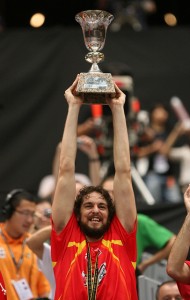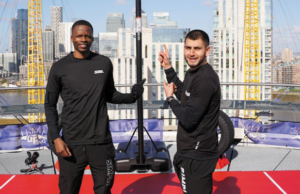BRAGGING RIGHTS BUT NO WORLD TITLE FOR BARCA
By Mark Woods on October 6, 2010The concept of a world club championship has floated around basketball for almost five decades. However, even with Europe’s champion overcoming the NBA’s best, a mechanism to crown an ‘official’ top team remains a work in progress.
Of course, there has long been an assumption that that the side who lifted the NBA title were duly coronated as ‘world champions’. Despite the growth of the game, and a greater awareness of the potency of Europe’s leading sides, it is boast that has not yet died of natural causes. The San Antonio Spurs, stacked with international talent, were the first to recognise that they had conquered only North America rather than the globe. Yet even this week, I heard one American broadcaster push the boundaries back once more. Insularity still reigns.
However it was Italian side Varese who were the first to stake a claim to the crown. FIBA instituted its own Inter-Continental Cup in 1966, contested initially by the best from Europe and South America. As at the Olympics, the NBA’s best remained excluded even if other U.S teams – notably three-time winners, the Akron Wingfoots – came, saw and conquered.

Pau Gasol won a world championship with Spain. But not with the Lakers (FIBA Archive)
That concept died in 1996 when Panathinaikos were the final winners of the William Jones Cup. It was then superseded by the McDonald’s Championship, an NBA-driven tournament which was the catalyst for the current wave of pre-season friendlies between NBA and international clubs.
In each of its nine editions, NBA teams prevailed. But there were close shaves. The Los Angeles Lakers escaped with a 116-114 win against Joventut Badalona in 1991. “We came really close to losing that,†recalls ex-Lakers forward James Worthy. “It showed us how good these teams were.†Then in the final edition, in Milan in 1999, the Spurs toiled in the semi-final against Varese before going onto lift the trophy.
Since then, FIBA has cultivated the idea of instituting a new World Club Cup. Like the footballing counterpart, the heavy schedule has thwarted its establishment. “It’s hard to get everyone to agree,†said one FIBA official. “Plus we are not finding anyone who will put up the money for it.â€
Other formats have been floated. There are calls for this year’s meeting between the Lakers and FC Barcelona to initiate a formal yearly challenge between the reigning champions of the Old and New Continent.
“You could have that every year, the European champions against the NBA champion,†said Lakers forward Pau Gasol.
“It could be exciting. But this is the only time of year that it could take place. And we’re in the middle of training camp whereas the European team would already be into competition and more ready than we are.â€
Other suggestions include staging the tie during the NBA’s All Star Weekend as a competitive alternative to the risible Saturday night skills contests. Scheduling it then, in Europe’s mid-season, might prove problematic. “It would be hard to find a time to do it,†Gasol added. “The distances are quite far.â€
Then again, you might argue, the NBA’s expedition back to London next March for the first-ever regular season games in Europe might suggest that it is not such an improbable idea. Football’s Premier League has all but abandoned its proposal to stage an extra match outside England each season. The NBA will continue regardless. And Commissioner David Stern sees the benefits of meaningful competition outside his normal geographic boundaries.
“In fact, I think our fans feel that it enhances our league because it grows the game around the world, it encourages more players to play our game, it makes our teams stronger,†he said.
For now, his league will restrict itself to pitting its own teams against each other once the serious business of the season gets under way. However, the old argument, that such inter-continental ties would not be competitive if they were staged during the campaign, no longer holds weight. The gap has closed between the NBA and the rest. And with Barcelona emerging with a 92-88 win over the Lakers, it can only fuel the fire to make it an annual tie.
“We would like that very much, but at the same time, it’s important that, if we do something like that, it would mean that the economic and the athletic, or sports‑related conditions would be the precise ones, the adequate ones to make it possible,” said Euroleague CEO Jordi Bertomeu.
“All I can expect and all I can do is to work with my staff, to work with our clubs to make sure that those conditions become a reality. And if we can reach those agreements and continue with the same collaboration that we’ve had so far between Euroleague and the NBA, I’m sure that that would be a possibility.”
And speaking ahead of Barcelona’s victory, Stern hinted that he might support the concept despite the logistical and timing issues. “We’ll see after this evening how that works its way out,” he added. “But I would guess that we will be in continued discussions with our friends at the Euroleague about an expansion of this possibility.”
Given the result at the Palau San Jordi, should we consider Barcelona the best team on Earth? Probably not. But they have as much right as the Lakers to make that boast.
Yet for now, in the absence of an official decider, the world champion club must remain a vacant title.
Do you like our work?
We have a tiny favour to ask. In 2018 we set out to make Hoopsfix sustainable by building our relationship directly with our readers. Up until now, Hoopsfix has been creating editorials, videos and podcasts to provide sorely missing coverage of the British game and its distinct culture and community.
We have funded Hoopsfix with our freelance work creating basketball media, but sadly that means not only does it fall behind our client’s priorities, but some of those clients are the same organisations we need to report objectively on putting us in a conflicted position.
We want to devote more time to our mission of helping British basketball reach its potential, and produce even more content for the basketball community by making Hoopsfix a sustainable 100% independent business funded directly by our readers through Patreon.
If everyone who enjoys our content chose to support us, our future would be much more secure. For as little as $3 per month, you can support Hoopsfix – and it only takes a minute.
We are tremendously honoured and humbled to have a community of people who value what we do, and we look forward to being at the forefront of the British game as it continues to evolve.









0 comments